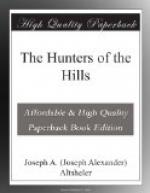“What are you dreaming about, Tayoga?” asked Robert, who also dreamed dreams.
The Onondaga shook himself and laughed a little.
“Of nothing,” he replied. “No, that was wrong. I was dreaming of the deer that we’ll soon find. Come, Lennox, we’ll go seek him.”
“And while you’re finding him,” said Willet, “I’ll be building the fire on which we’ll cook the best parts of him.”
Tayoga and Robert went together into the forest, the white youth taking with him his rifle, which, however, he did not expect to use. It was merely a precaution, as the Hurons, Abenakis, Caughnawagas and other tribes in the north were beginning to stir and mutter under the French influence. And for that reason, and because they did not wish to alarm possible game, the two went on silent foot.
No other human beings were present there, but the forest was filled with inhabitants, and hundreds of eyes regarded the red youth with the bow, and the white youth with the rifle, as they passed among the trees. Rabbits looked at them from small red eyes. A muskrat, at a brook’s edge, gazed a moment and then dived from sight. A chipmunk cocked up his ears, listened and scuttled away.
But most of the population of the forest was in the trees. Squirrels chattering with anger at the invaders, or with curiosity about them, ran along the boughs, their bushy tails curving over their backs. A huge wildcat crouched in a fork, swelled with anger, his eyes reddening and his sharp claws thrusting forth as he looked at the two beings whom he instinctively hated much and feared more. The leaves swarmed with birds, robins and wrens and catbirds and all the feathered tribe keeping up an incessant quivering and trilling, while a distant woodpecker drummed portentously on the trunk of an old oak. They too saw the passing youths, but since no hand was raised to hurt them they sang, in their way, as they worked and played.
The wilderness spell was strong upon Tayoga, whose ancestors had lived unknown ages in the forest. The wind from the north as it rustled the leaves filled his strong lungs and made the great pulses leap. The bow in his hand fitted into the palm like a knife in its sheath. He heard the animals and the birds, and the sounds were those to which his ancestors had listened a thousand years and more. Once again he was proud of his heritage. He was Tayoga, a coming chief of the Clan of the Bear, of the nation Onondaga, of the League of the Hodenosaunee, and he would not exchange places with any man of whom he had heard in all the world.
The forest was the friend of Tayoga and he knew it. He could name the trees, the elm and the maple, and the spruce and the cedar and all the others. He knew the qualities of their wood and bark and the uses for which every one was best fitted. He noticed particularly the great maples, so precious to the Iroquois, from which they took sap and made sugar, and which gave an occasion and name to one of their most sacred festivals and dances. He also observed the trees from which the best bows and arrows were made, and the red elms and butternut hickories, the bark of which served the Iroquois for canoes.




